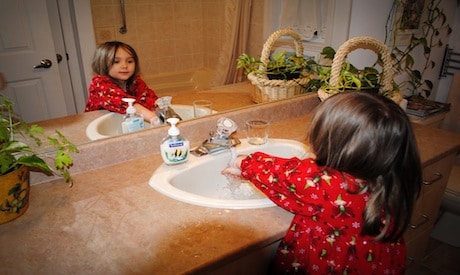
The Food and Drug Administration (FDA) believe evidence is lacking that antibacterial soap products are more effective at preventing illness than handwashing with soap and water. The FDA is also concerned that antibacterial soaps contain chemical ingredients, like triclosan and triclocarban, which may actually contribute to bacterial resistance to antibiotics.
Studies show that triclosan may change the way hormones work in the body. Due to the concerns, the FDA issued a proposed rule on December 16, 2013 that would require manufacturers to provide more data to demonstrate the safety and effectiveness of antibacterial soaps. The rule only covers antibacterial soaps and body washes that must be used with water and not antibacterial hand sanitizers or hand wipes. The public comment period for the rule lasts 180 days.
The FDA and EPA are collaborating on the science and issues associated with triclosan. Both federal agencies are reviewing the effects of the chemical. The EPA regulates it as a pesticide and is currently updating its assessment of its effects when it is used in pesticides. The FDA is focusing on the effects of triclosan on consumers who use it on a regular basis.
Read more about handwashing
Handwashing is the most effective way to prevent disease
The FDA is emphasizing the importance of handwashing, as is another federal agency, the Centers for Disease Control (CDC), which calls handwashing “like a do-it-yourself vaccine.” The federal agency recommends it as one of the best ways to “remove germs, avoid getting sick and prevent the spread of germs to others.” The World Health Organization (WHO) also recommends handwashing, and the organization’s website states that “most health care-associated infections are preventable through good hand hygiene – cleaning hands at the right times and in the right way.”
The highly respected Mayo Clinic is a big advocate of handwashing with soap and water for several reasons. One of them is that it is “one of the best ways to avoid getting sick and spreading illness.” Another reason is that “antibacterial soap is no more effective at killing germs than is regular soap.” The Mayo Clinic believes that using antibacterial soap “may even lead to the development of bacteria that are resistant to the product's antimicrobial agents – making it harder to kill these germs in the future.”
The Mayo Clinic lists a number of handwashing recommendations:
- Wet your hands with running water.
- Apply liquid, bar or powder soap.
- Lather well.
- Rub your hands vigorously for at least 20 seconds. Remember to scrub all surfaces, including the backs of your hands, wrists, between your fingers and under your fingernails.
- Rinse well.
- Dry your hands with a clean or disposable towel or air dryer.
- If possible, use your towel to turn off the faucet.
There are several handwashing campaigns, both worldwide and national. A blog post by Handryers UK, one of the leading suppliers of bathroom hygiene equipment in the UK, mentions handwashing awareness campaigns around the world. One of them occurs every year on October 15 when more than 200 million people in more than 100 countries take part in handwashing celebrations. Another occurs in the U.S. during National Handwashing Awareness week which takes place from December 1 to 7.
Read more about antibiotic resistance
Photo: Clover1

